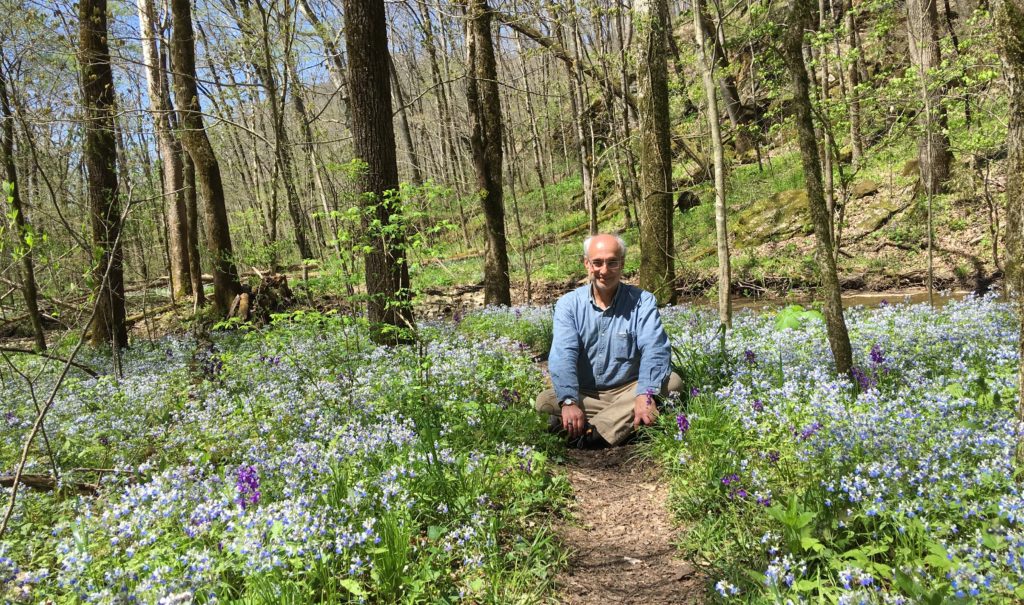
In celebration of 91Classical’s Local Composers Month, we posed six questions to some of Nashville’s classical music creators. For the final installment, get to know a little more about Michael Alec Rose, who is also an Associate Professor of Composition at the Blair School of Music.
How would you describe your compositional style?
It’s committed to the joys and difficulties at work in all my favorite classical music (including The Beatles, Duke Ellington, and Regina Spektor), all of it (no matter what style or genre) empowered by the same paradoxical and interdependent energies: clear and complex structure, transparent expression of feeling, harmonic richness, irrational emotional chaos, rhythmic power, strategically measured and potentially unlimited access to an entire universe of interconnections among all the allied arts, as well as with the natural world, unforgettable melodic stuff, and a shared company of angels and demons. That’s the fathomless generosity I’m always, impossibly hoping for. How else could I show my gratitude for all the music I love?
What do you love about being a composer in Nashville?
Never having had to answer this question before! No, seriously, I love it. I realized early on I was working against the grain in three exciting, always challenging, sometimes shattering ways: I’m a born Yankee in the western capital of the Lost War, I’m a Jew in the Bible Belt, and I’m a “classical composer” in Music City. So much fun.
Can you tell us a little bit about something you’ve recently composed?
Lolly Willowes, yes! What I feel in my heart, what I know to be true with my composer’s and teacher’s intuition, is that the Lolly Willowes Project has innovated a new kind of musical theater, taking its cue from so many beloved precedents. (That’s all. No big whoop.) Of course it’s not for me to say such a thing. Rather, it’s what my entire company feels, and what so many folks who experienced the show have also expressed to us. The entire process of the show’s coming into being is an odyssey that defines for me what makes possible the enduring vitality and value of classical music in the 21st century.
It all comes down to a shared vision, an absolute mutual trust and respect among a handful of artists who believe in something. Of course this has always been true. Sylvia Townsend Warner’s novel just made it true for us, along with the wonderfully kind executor of her estate, and our brilliant advocate in the Permissions Office at her publisher. Then we got the city of Hosuton’s maximum development award of $15,000, along with another $8,500 raised through our Indiegogo campaign. It was the most overwhelming, painstaking, arduous, powerful musical experience of my life. These singers, these players, these dancers, this director, this costume designer—all of them are artists who gave everything of their enormous skill, talent, and vision to the show. I am the most fortunate composer alive.
Which composer do you wish was better known?
Wolfgang Amadeus Mozart (not kidding).
After composing for over three decades, you’ve said that you can now look back more objectively at your work, as if it belonged to someone else. What’s the most important thing you’ve learned from this kind of retrospection?
Where did I say such a thing?? Oh yeah, it must have been in the artistic statement on my website. I do like what I wrote there, but I guess I feel a little differently about this particular point now (I wrote the statement a few years ago). When you get old enough (as I have), you’re better able to accept the things you did in your youth, better equipped both to forgive all the follies and celebrate the combination of forces at work early on. I know now, for sure, often with a sense of wonder, that my music of 1985 or 1992 or 2001 belongs to ME, not someone else. Some of it is pretty good. There’s nothing to learn from such retrospection, though, at least not for me. For the same reason, I never look at old photo albums, and I am ruthless at deleting things from my iPhone. That’s because what I’m working on now occupies me constantly. This constancy, that animal-like idiocy of mine (as my wife regularly informs me), which is to live only for the present moment, and to provide unstintingly for the moment immediately following——this character trait/flaw of mine hasn’t changed one bit in the past half-century. It’s what makes anything of value in my music possible in the first place.
Your book, Audible Signs, is about decoding the “signs” that composers give in us their music. Can you explain what a musical sign is, and give an example of one of your favorites?
Just as there is an iconography in the history of paintings— skull as memento mori, the Virgin Mary’s blue gown showing her purity and most precious value (the paint was made from crushed lapis lazuli!)— so, too, is there an iconography in the history of music, a set of given signs, to be shared and understood and appreciated by anyone who wants to be initiated into that history. In my book, I show just how much fun it can be to HEAR how a great composer deploys such audible signs, both exploiting and transforming their conventional connotations. The composer who I wish was better known does it all the time. A really obvious instance is the way he uses woodwinds to give us a feeling of listening en plein air, right out in the countryside, our ears actually caressed by gentle winds. Evidence of Mozart’s deployment of this archaic iconography of wind instruments is everywhere apparent in his instrumental music, but it’s especially and ingeniously vivid, of course, in his operas, of course, where the magic flute, the cuckold’s horns, and the out-of-doors invitations of all the woodwinds help to make the experience overwhelmingly sensuous.
Keep up with Michael Alec Rose and his music on his website.

